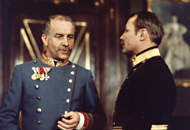The Griensteidl.... Kraus's vision of hell
Since tackling both the ideas of Kraus and Hofmannsthal would far exceed my allotted 250 words, I have chosen to focus specially on Kraus for this entry. If I end up lacking in comments, that's okay. In my opinion, Kraus’s concerns and moral dilemmas with language were rooted in the very way he saw the intellectual culture of Vienna. In the introduction of his essay “The Demolished Literature,’ Kraus says, “Vienna is now being a demolished into a metropolis… Our literature is bracing itself for a period of homelessness; the threads of artistic creativity are being cruelly severed.” So what does this convoluted comment mean? Everything boils down to Kraus’s elitist views on language. For Kraus language was the most vital medium for explaining all the fallacies and injustices of the world. He loathed his contemporaries, for he saw their use of language as careless- for him, this meant that they looked at all the issues of the world in a careless matter. So, for Kraus, any spelling error, any punctuation mistake, or any misuse of a nominative, dative, or accusative case showed a gross misuse of language. Herein lies the moral dilemma of language for Kraus, because for him language was a means to serve humanity, and not to command it. In essence, language’s diving purpose was not to re-hash and re-word common opinions and wide spread main stream beliefs; it was a way to express ORIGINAL THOUGHT. So why was this such a big deal? Why did Kraus loathe his coffee house contemporaries? For him, The Griensteidl coffeehouse was nothing but a literary filth infested breeding ground for everything he saw as an immoral use of language. Kraus said, “The Griensteidl has definitely become the gathering place for people who want to fritter away their abilities, and one shouldn’t wonder at the sterility of talented people who sit so packed in together in a coffeehouse that they mutually hinder each other’s development.” For Kraus, no one in this environment could achieve quality work, because they were all crammed into an over sized room feeding off each others’ ideas. Between what he saw as their vast grammatical errors and inability to come up with any original thought, these people embodied everything Kraus saw as a perversion of language. In his mind, his coffeehouse acquaintances didn’t use language to convey their own original thoughts- they merely fed off the unoriginal and washed out works of their colleagues. In the most immoral fashion they were using language as a way to command the public to agree to what they thought; rather than using language as a way to serve and educate the population.
So, after far exceeding my 250 words, what does this all mean in a nutshell? For Kraus, language in its most moral sense us used justly and correctly must be grammatically perfect as a reflection of how purely and rightly and author views his topic and the world itself. It should express ORIGINAL thought, not the idea that the guy next to you drinking a latte was talking to you about yesterday. And lastly, language is a way to serve humanity through an expression of your thoughts, not a means to command them how to think. Language in its perfect and subliminal sense should convey a utopia of individuality. And for Kraus, individuality was the last thing he saw as coming out of Vienna's coffeehouses.



1 comment:
This is really essentially the key for Kraus, the immorality of the misuse of language. However, he takes great pains to let us know that these people really can write, they have the technical ability, yet this does not make them writers. A combination of talent and ability is needed to be a truly great writer. The fact that they spent their time regurgitating each other’s ideas and congratulating each other destroyed their ability to be original. I actually believe that Kraus, on the other hand, really did want to command people through his literary ability. He knew that words were the soul of society and that they are the most effective way to effect change. By merely reading something, people can be changed or a long-held belief can be altered. Words are power, yet “Young Vienna” misused or ignored this power in their orgy of self-congratulation. In “Demolished Literature” Kraus finishes with the comment “All the literary implements—lack of talent, premature mellowness, poses, megalomania, sweet young girls, neckties, affection, false datives, monocles, and rarified nerves—will be hastily gathered up. Everything has to go.” This “everything” is all-inclusive; it is time for something new.
Post a Comment